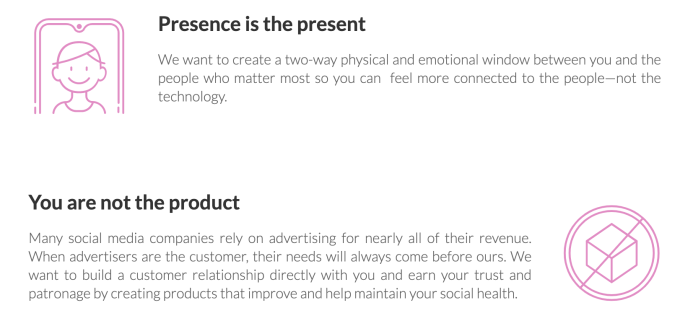Recent Funding
Auto Added by WPeMatico
Auto Added by WPeMatico
Amazon may have a market cap of more than $1 trillion, but Finbarr Taylor, CEO of Y Combinator-backed startup Shogun, said the e-commerce giant is “kind of dropping the ball.”
Specifically, he argued that the experience of shopping on Amazon — not what happens after you buy something, but browsing the website itself — is pretty bad, full of sponsored results and fake products.
“What we’re seeing happen is that all this vast wave of direct-to-consumer brands is nibbling around edges of Amazon and beating them on buying experience,” Taylor said.
Shogun was designed to support those brands. Taylor and his co-founder Nick Raushenbush created the first product in 2015, and they treated it as a side project at first. But Taylor said that by May 2017, “It ate up all of our free time and it was obviously much bigger than we expected,” so they quit their jobs (Taylor was working as a software engineer at Y Combinator) and devoted themselves to it full-time.
The company now has 11,000 customers, including MVMT, K-Swiss and Leesa. And today, Shogun is announcing that it has raised a $10 million Series A, led by Initialized Capital, with participation from VMG Partners and YC. (The startup has now raised a total of $12 million.)
The company’s first product, Page Builder, offers a drag-and-drop interface to make it easier for e-commerce brands to build their storefronts on Shopify, BigCommerce, Salesforce and Magento.

And there’s a new product, Shogun Frontend, which allows brands to create a web storefront that’s entirely customized while still using one of the big commerce platforms as their back end.
Taylor pitched this as part of a broader trend toward “headless commerce,” where the e-commerce front end and back end are handled separately. He suggested that this is a “mutually beneficial” split, as Shopify and its competitors are going “super deep” on building the infrastructure needed to operate a store online, while Shogun focuses on the actual experience of the customer visiting that store.
Meanwhile, website builders like Squarespace and Weebly (owned by Square) have introduced e-commerce features, but Taylor suggested that they’re still “not really a professional choice” for most e-commerce businesses.
As one of the key features of Shogun Frontend, Taylor pointed to the fact that it creates progressive web apps that should be as fast and smooth as a native app.
Brett Gibson, general partner at Initialized Capital and a Shogun board member, made a similar point in a statement:
For DTC brands competing against goliaths like Amazon, Shogun Frontend now gives them features and capabilities once only reserved for enterprise companies. And when it comes to speed, Shogun Frontend’s sub-second load time is the critical difference between retaining or losing a customer.
Taylor added that the company will be “continuing to invest in Page Builder too,” but he suggested that Frontend is “more of an enterprise offering” that can help Shogun’s biggest customers “future proof themselves.”
Powered by WPeMatico
Customer engagement platform Leanplum today announced that it has raised a $27 million extension to its 2017 $47 million Series D round. This additional funding was led by previous investors Norwest Venture Partners and Shasta Ventures. Kleiner Perkins, Canaan and Launchub also participated in this round, which the company says it will use to bolster its product development and go-to-market efforts. With this, Leanplum has now raised a total of $125 million.
Maybe just as importantly, Leanplum also announced a major shakeup of its executive ranks. The company appointed George Garrick as president and CEO, and Sheri Huston as chief financial officer. Co-founder and former CEO Momchil Kyurkchiev will step into the chief product officer role.
Garrick brings a wealth of experience with him, having been the CEO of companies like Flycast, Placeware, Wine.com and Tapjoy . Huston, too, comes into the role with a lot of industry experience as the former CFO at Comscore and LiquiBox. The company is also adding Dynamic Signal founder Russ Fradin to its board of directors.
The company describes the changes in its executive ranks as a “transition.”
“Many if not most startups at some point in their growth realize that a management transition makes sense as the requirements for the CEO evolve from starting and proving a company, to running and scaling it,” Garrick told us in a statement. “Leanplum’s board and founders agreed that such a transition would be appropriate as Leanplum accelerates its growth phase.”
This was echoed by Kyurkchiev: “George is the right leader for Leanplum. His strong management experience with companies at our stage and in our domain will be essential for Leanplum as we continue to drive growth and expand globally.”
Leanplum says about 2 billion people used apps and websites that use its services in 2019.
As for the new funding, the company says it was simply easier to extend its Series D, which has the same investors as the original D round. “The board felt it was easier and more appropriate to just extend the D round rather than move into the next letter. Also, we wanted to minimize ‘letter creep,’ ” Garrick said.
Powered by WPeMatico
Over the past 12 months, Maven, the benefits provider focused on women’s health and family planning, has expanded its customer base to include more than 100 companies, and grown its telehealth services to include 1,700 providers across 20 specialties — for services like shipping breast milk, finding a doula and egg freezing, fertility treatments, surrogacy and adoption.
The New York-based company, which offers its healthcare services to individuals, health plans and employers, has now raised an additional $45 million to expand its offerings even further.
Its new money comes from a clutch of celebrity investors, like Mindy Kaling, Natalie Portman and Reese Witherspoon, and institutional investors led by Icon Ventures and return backers Sequoia Capital, Oak HC/FT, Spring Mountain Capital, Female Founders Fund and Harmony Partners. Anne Wojcicki, the founder of 23andMe, is also an investor in the company.
“Maven is addressing critical gaps in care by offering the largest digital health network of women’s and family health providers,” said Tom Mawhinney, lead investor from Icon Ventures, who will join the Maven board of directors, in a statement. “With its virtual care and services, Maven is changing how global employers support working families by focusing on improving maternal outcomes, reducing medical costs, retaining more women in the workplace, and ultimately supporting every pathway to parenthood.”
In the six years since founder Katherine Ryder first launched Maven, the company has raised more than $77 million for its service and she became a mother of two boys.
“You go through this enormous life experience; it’s hugely transformative to have a child,” she told TechCrunch after announcing the company’s $27 million Series B round, led by Sequoia. “You do it when your career is moving up — they call it the rush hour of life — and with no one supporting you on the other end, it’s easy to say ‘screw it, I’m going home to my family’ … If someone leaves the workforce, that’s fine, it’s their choice, but they shouldn’t feel forced to because they don’t have support.”
Some of Maven’s partners include Snap and Bumble to provide employees access to its women’s and family health provider network. The company connects users with OB-GYNs, pediatricians, therapists, career coaches and other services around family planning.
Powered by WPeMatico
The 400,000 distribution yards located in the U.S. are critical hubs for the supply chain. Now one startup is aiming to make the yard truck — the centerpiece of the distribution yard — more efficient, safer and cleaner, with an autonomous system.
Outrider, a Golden, Colo. startup previously known as Azevtec, came out of stealth Wednesday to announce that it has raised $53 million in seed and Series A funding rounds led by NEA and 8VC. Outrider is also backed by Koch Disruptive Technologies, Fraser McCombs Capital, warehousing giant Prologis, Schematic Ventures, Loup Ventures and Goose Society of Texas.
Outrider CEO Andrew Smith said distribution yards are ideal environments to deploy autonomous technology because they’re well-defined areas that are also complex, often chaotic and with many manual tasks.
“This is why a systems approach is necessary to automate every major task in the yard,” Smith said.
Outrider has developed a system that includes an electric yard truck equipped with a full stack self-driving system with overlapping suite of sensor technology such as radar, lidar and cameras. The system automates the manual aspect of yard operations, including moving trailers around the yard as well as to and from loading docks. The system can also hitch and unhitch trailers, connect and disconnect trailer brake lines, and monitor trailer locations.
The company has two pilot programs with Georgia-Pacific and four Fortune 200 companies in designated sections of their distribution yards. Over time, Outrider will move from operating in specific areas of these yards to taking over the entire yards for these enterprise customers, according to Smith.
“Because we’re getting people out of these yard environments, where there’s 80,000 pound vehicles, we’re delivering increased efficiency,” Smith told TechCrunch in a recent interview. That efficiency is not just in moving the trailers around the yard, Smith added. It also helps move the Class 8 semi trailers used for hauling freight long distances through the system and back on the road quickly.
“We can actually reduce the amount of time the over-the-road guys are stuck sitting at a yard trying to do a pickup or drop-off,” Smith said.
Smith sees a big opportunity to demonstrate the responsible deployment of autonomy as well as clean up yards filled with diesel-powered yard trucks.
“If there was ever a location for near-term automation and electrification of the supply chain, it’s here,” he said. “Our customers and suppliers understand there’s a big opportunity for these autonomy systems to accelerate the deployment of 50,000 plus electric trucks in the market because they are a superior platform for automation.”
Powered by WPeMatico
As cybercrime continues to evolve and expand, a startup that is building a business focused on endpoint security has raised a big round of funding. SentinelOne — which provides a machine learning-based solution for monitoring and securing laptops, phones, containerised applications and the many other devices and services connected to a network — has picked up $200 million, a Series E round of funding that it says catapults its valuation to $1.1 billion.
The funding is notable not just for its size but for its velocity: it comes just eight months after SentinelOne announced a Series D of $120 million, which at the time valued the company around $500 million. In other words, the company has more than doubled its valuation in less than a year — a sign of the cybersecurity times.
This latest round is being led by Insight Partners, with Tiger Global Management, Qualcomm Ventures LLC, Vista Public Strategies of Vista Equity Partners, Third Point Ventures and other undisclosed previous investors all participating.
Tomer Weingarten, CEO and co-founder of the company, said in an interview that while this round gives SentinelOne the flexibility to remain in “startup” mode (privately funded) for some time — especially since it came so quickly on the heels of the previous large round — an IPO “would be the next logical step” for the company. “But we’re not in any rush,” he added. “We have one to two years of growth left as a private company.”
While cybercrime is proving to be a very expensive business (or very lucrative, I guess, depending on which side of the equation you sit on), it has also meant that the market for cybersecurity has significantly expanded.
Endpoint security, the area where SentinelOne concentrates its efforts, last year was estimated to be around an $8 billion market, and analysts project that it could be worth as much as $18.4 billion by 2024.
Driving it is the single biggest trend that has changed the world of work in the last decade. Everyone — whether a road warrior or a desk-based administrator or strategist, a contractor or full-time employee, a front-line sales assistant or back-end engineer or executive — is now connected to the company network, often with more than one device. And that’s before you consider the various other “endpoints” that might be connected to a network, including machines, containers and more. The result is a spaghetti of a problem. One survey from LogMeIn, disconcertingly, even found that some 30% of IT managers couldn’t identify just how many endpoints they managed.
“The proliferation of devices and the expanding network are the biggest issues today,” said Weingarten. “The landscape is expanding and it is getting very hard to monitor not just what your network looks like but what your attackers are looking for.”
This is where an AI-based solution like SentinelOne’s comes into play. The company has roots in the Israeli cyberintelligence community but is based out of Mountain View, and its platform is built around the idea of working automatically not just to detect endpoints and their vulnerabilities, but to apply behavioral models, and various modes of protection, detection and response in one go — in a product that it calls its Singularity Platform that works across the entire edge of the network.
“We are seeing more automated and real-time attacks that themselves are using more machine learning,” Weingarten said. “That translates to the fact that you need defence that moves in real time as with as much automation as possible.”
SentinelOne is by no means the only company working in the space of endpoint protection. Others in the space include Microsoft, CrowdStrike, Kaspersky, McAfee, Symantec and many others.
But nonetheless, its product has seen strong uptake to date. It currently has some 3,500 customers, including three of the biggest companies in the world, and “hundreds” from the global 2,000 enterprises, with what it says has been 113% year-on-year new bookings growth, revenue growth of 104% year-on-year and 150% growth year-on-year in transactions over $2 million. It has 500 employees today and plans to hire up to 700 by the end of this year.
One of the key differentiators is the focus on using AI, and using it at scale to help mitigate an increasingly complex threat landscape, to take endpoint security to the next level.
“Competition in the endpoint market has cleared with a select few exhibiting the necessary vision and technology to flourish in an increasingly volatile threat landscape,” said Teddie Wardi, managing director of Insight Partners, in a statement. “As evidenced by our ongoing financial commitment to SentinelOne along with the resources of Insight Onsite, our business strategy and ScaleUp division, we are confident that SentinelOne has an enormous opportunity to be a market leader in the cybersecurity space.”
Weingarten said that SentinelOne “gets approached every year” to be acquired, although he didn’t name any names. Nevertheless, that also points to the bigger consolidation trend that will be interesting to watch as the company grows. SentinelOne has never made an acquisition to date, but it’s hard to ignore that, as the company to expand its products and features, that it might tap into the wider market to bring in other kinds of technology into its stack.
“There are definitely a lot of security companies out there,” Weingarten noted. “Those that serve a very specific market are the targets for consolidation.”
Powered by WPeMatico
“I don’t feel good about that. That sucks,” Chrys Bader-Wechseler reflects when asked about the bullying that went down on the anonymous app Secret he co-founded in 2013. After $35 million raised, 15 million users and a spectacular flame out two years later, the startup was dead. “Since I left Secret I feel alive and aligned with my values and my purpose again.”
But there was one bright side to Secret letting you post without a name or consequences. People opened up, got vulnerable and felt less alone when comments revealed they weren’t the only person dealing with a certain struggle. What Bader learned from watching Secret’s users “do this in the dark” was the realization that “actually, we need to learn to do this in the light, to have that same kind of dialogue, but do it openly with each other.”
So began the journey to Bader’s new startup Ikaria that’s exclusively revealing itself to the world today on TechCrunch. It’s a different kind of chat app, named after the Greek island where a close-knit community helps extend people’s lifespans. The six-person Santa Monica team is funded by a $1.5 million seed round led by Initialized Capital and Fuel Capital. People can sign up for early beta access here.

During a long interview about the startup, Bader and his co-founder Sean Dadashi were cagey about exactly how Ikaria works, as it’s still in development. Amidst all the philosophical context about the app’s intention, I was able to pull out a few details about what the product will actually look like.
“Basically, since 2004, technology has created this monumental shift in the human social experience. We’re more connected than ever technically but all the studies show we’re lonelier than ever,” Bader explains. “It’s like eating McDonald’s to get healthy. It’s not the right source of nutrition for our social well-being because true connection requires a level of vulnerability, presence, self-disclosure and reciprocity that you don’t really get on these platforms.”
Ikaria isn’t another feed. It’s a safe space where you can chat with close friends and family, or people going through similar life challenges. Members of these group chats will optionally go through guided experiences that help them reflect on and discuss what’s going on in their hearts and minds. This could become a whole new media format where outside creators or mental health professionals could produce and contribute their own guided experiences.

“Part of the reason we’re announcing this is that . . . it’s a call to action to involve all these practitioners and people who are doing these types of things and giving them a platform to allow them to facilitate these kind of group bonding experiences through a platform where they can extend their practices into the digital world,” Bader tells me. What Calm and Headspace did for making meditation more mainstream and accessible, Ikaria wants to do for mental health through online togetherness.
Ikaria already has a sizable closed beta going, which the startup plans to continue until it finds product fit, and it hopes to know its official release timeline by the end of the year. “We’re not going to launch this until we know 40% of people would be disappointed if they couldn’t use it.”
Rather than monetizing by exploiting people’s attention, Ikaria plans to develop a “customer relationship” with users, which could mean subscription access or in-app payments for buying content. Perhaps one user could act as the sponsor and purchase an experience for their whole group chat. Until then, it’s got its seed funding from Initialized, Fuel Capital, F7 Ventures, Ryan Hoover’s Weekend Fund, Backend Capital, Day One Ventures, Shrug, Todd Goldberg and Superhuman’s Rahul Vohra.
“The hope is that eventually this would be an app you use instead of iMessage, to increase your sense of presence,” Bader explains, revealing its grand ambitions. Why would we need to replace our core chat apps? Well for one thing, they don’t understand who really matters to you. If an app understood who your mom is, it could give her messages special prevalence or remind you to contact her.

Bader met Dadashi through an offline men’s group for discussing life, love and everything in the wake of Secret’s collapse and a rough romantic breakup. After just a few weeks of these meetups, they say they felt closer to each other than to most of their friends. Only later did Bader, a designer by trade, discover that Dadashi was a coder who’d been CTO of electronics company MHD Enterprises before starting a travel and lifestyle startup for mental wellness, called Somatic Studios. They tried working together on an app for sharing quotes from your friends but scrapped it.
Together, the pair went on to research the rapid rise of other vulnerability-focused meetup organizations like the one where they met, including Evryman, ManKind Project, Quilt, Authentic Relating, Circling, and T-Groups. Though they knew that to have a chance at impact at scale, they’d need to build a mobile app familiar enough to get people over the hurdle of starting a mindfulness practice. They laid out a few principles to build by: a focus on relationships instead of Likes and followers, conscious design that won’t exploit people’s attention or weaknesses, no ads, and keeping all data private and in control of the user.

There are other startups hoping to address the sad state of mental health from different angles. Talkspace offers a mobile connection to licensed therapists, though it can be pricey at $65 to $99 per week. 7 Cups and TalkLife makes peer-to-peer counseling from volunteers free, though these aren’t professionals. There are also plenty of journaling products, gratitude practice apps and wellness podcasts out there. But Ikaria’s approach, combining mental health content with group chats of people you trust, feels unique.
Having known Bader since the Secret days, it’s obvious that working with Dadashi has made him happier and more centered. Ikaria is an app he can wake up feeling good about each day. “You know, I don’t like to speak ill of David [Byttow, Secret’s CEO who sources say was verbally abusive to employees], but that relationship was very, very toxic and taxing for me. And this time around with Sean, as I’m sure you can tell, is the polar opposite.”
If Ikaria can help people develop the open and honest relationships with friends or peers like building it has done for Bader and Dadashi, it could be a beacon amidst a sea of time unwell spent.
Powered by WPeMatico
Want to spice up the bedroom without paying for pills or awkward visits to a sex therapist? A new app called Lover lets you take a sexual personality quiz, explore carnal knowledge tutorials and discretely figure out which turn-ons you share with your partner. Built by board-certified sexual medicine clinical psychologist Dr. Britney Blair, Lover launches today on iOS with $5 million in seed funding from Tinder founder Sean Rad and other investors.
“It is strange that there are such taboos around sex when it is something we all do…whether we enjoy ourselves or not. We think it is time to start the conversation around this important aspect of our health,” says Dr. Blair. “We believe Lover can help build confidence, facilitate communication, improve partner connection and just raise consciousness about sex and sexuality.”

A solid portion of Lover’s content is free for the first seven days, including audio guides to oral sex, video explainers on how to be generous in bed and multi-step “playlists” of content like “Getting Hard, Made Easy.” Lover charges $9.99 per month or $59.99 per year for continued access to themed educational materials like “Coreplay Not Foreplay” and “Fantasy To Reality” that are recommended based on the results of your sexual questionnaire.
“Almost 50% of women and 40% of men have a sexual complaint . . . [but] most people don’t realize how common and treatable their issues are,” Dr. Blair tells me. “In our [pre-launch tests] focused purely on erectile dysfunction, 62% of users reported improvements to their erections within three weeks of using the app. That’s pretty wild when you think Viagra’s efficacy rate is approximately 65% and it lasts only five hours.”
Startups like digital pharmacy Ro have scored $500 million valuations just 18 months after launch by prescribing and selling men’s health drugs like Viagra. Lover sees a market for education-based alternative approaches to sexual wellness.

Lover co-founders (from left): Jas Bagniewski, Dr. Britney Blair and Nick Pendle
Dr. Blair got interested in the space a decade ago after a Stanford grad school lecture illuminated how prevalent sexual problems are but how quickly they can be resolved with learning and communication. She teamed up with her CEO Jas Bagniewski, who’d been the manager of Europe’s largest e-commerce business, Zalando in the U.K., and a founder of City Deal that sold to Groupon. Bagniewski and fellow Lover co-founder Nick Pendle started European Casper mattress competitor Eve Sleep and brought it to IPO.
The plan is to combine Dr. Blair’s educational materials with Bagniewski and Pendle’s e-commerce chops to monetize Lover through subscriptions and eventually recommending products like sex toys for purchase. Now they have $5 million in seed funding led by Lerer Hippeau, and joined by Manta Ray Ventures, Oliver Samwer’s Global Founders Capital, Fabrice Grinda and Jose Marin. The cash will go toward building out an Android app and adding games that partners can play together in bed.

There are plenty of random sex tip websites out there. Lover tries to differentiate itself by personalizing content based on the results of a Myers-Briggs-esque quiz. This asks you how adventurous, communicative and assertive you are. You then receive a classification like “The Muse” with a few pages of explanation, for example, revealing how you like to inspire others while being the center of attention.
From there, Lover can suggest guides for mastering your own sexual personality or branching out into new behavior patterns. There’s also a feature copied from another app called XConfessions for figuring out what you and your partner like. You connect your apps and then separately swipe yes or no on questions about whether you’d like “having your partner drip candle wax on you” or “your partner dressing as a strict cop.” If you and they match, the app tells you both so you can try it out.
Overall, Lover’s content is a lot higher quality and more compassionate than where most people learn about sex: pornography. Having a real sexual medicine doctor overseeing the app lends credibility to Lover. And the design and tone throughout make you feel empowered rather than sleazy.
Still, Dr. Blair admits that “it’s hard to motivate people into behavioral change, people already have subscription apps on their phones and we may run into ‘subscription fatigue.’ ” People might feel natural paying for Viagra because the impact is obvious. The value of a subscription to sex tips might seem too vague or redundant to what’s free online.
To get a lot of users opening their wallets, not just their pants, Lover will need to do a better job of previewing what’s behind the paywall, and offering more interactivity that online content lacks. But if it can give users one unforgettable night thanks to its advice, it may be able to seduce them for the long-run.
Powered by WPeMatico
Simsim, a social commerce startup in India, said on Friday it has raised $16 million in seven months of its existence as it attempts to replicate the offline retail experience in the digital world with help from influencers.
The Gurgaon-based startup said it raised $16 million across seed, Series A and Series B financing rounds from Accel Partners, Shunwei Capital and Good Capital. (The most recent round, Series B, was of $8 million in size.)
“Despite e-commerce players bandying out major discounts, most of the sales in India are still happening in brick-and-mortar stores. There is a simple reason for that: Trust,” explained Amit Bagaria, co-founder of Simsim, in an interview with TechCrunch.

The vast majority of Indians are still not comfortable with reading descriptions — and that too in English, he said.
Simsim is taking a different approach to tackle this opportunity. On its app, users watch short-videos produced in local languages by influencers who apply beauty products or try out dresses and explain the ins-and-outs of the products. Below the video, the items appear as they are being discussed and users can tap on them to proceed with the purchase.
“Videos help in educating users about the category. So many of them may not have used face masks, for instance. But it becomes easier when the community influencer is able to show them how to apply it,” said Rohan Malhotra, managing partner at Good Capital, in an interview with TechCrunch.
Influencers typically sell a range of items and users can follow them to browse through the past catalog and stay on top of future sales, said Bagaria, who previously worked at the e-commerce venture of financial services firm Paytm .
“This interactiveness is enabling Simsim to mimic the offline stores experience,” said Malhotra, who is one of the earliest investors in Meesho, also a social commerce startup that last year received backing from Facebook and Prosus Ventures.
“The beauty to me of social commerce is that you’re not changing consumer behavior. People are used to consuming on WhatsApp — and it’s working for Meesho. Over here, you are getting the touch and feel experience and are able to mentally picture the items much clearer,” he said.
Simsim handles the inventories, which it sources from manufacturers and brands, and it works with a number of logistics players to deliver the products.
“Several Indian cities and towns are some of the biggest production hubs of various high-quality items. But these people have not been able to efficiently sell online or grow their network in the offline world. On Simsim, they are able to work with influencers and market their products,” said Bagaria.
The platform today works with more than 1,200 influencers, who get a commission for each item they sell, said Bagaria, who plans to grow this figure to 100,000 in the coming years.
Even as Simsim, which has been open to users for six months, is still in its nascent stage, it is beginning to show some growth. It has amassed over a million users, most of whom live in small cities and towns, and it is selling thousands of items each day, said Bagaria.
He said the platform, which currently supports Hindi, Tamil, Bengali and English, will add more than a dozen additional languages by the end of the year. In about a month, Simsim also plans to start showing live videos, where influencers will be able to answer queries from users.
A handful of startups have emerged in India in recent years that are attempting to rethink the e-commerce market in the nation. Amazon and Walmart, both of which have poured billions of dollars in India, have taken a notice too. Both of them have added support for Hindi in the last two years and have made several more tweaks to their platforms to expand their reach.
Powered by WPeMatico
Marketing startup Habu is emerging from stealth today and announcing that it has already raised $15 million in Series A funding.
The company comes out of super{set}, the startup studio created by Krux founders Tom Chavez and Vivek Vaidya. In fact, Chavez is Habu’s chairman, Vaidya serves as CTO and their former Krux colleague Matt Kilmartin (who eventually became chief customer officer for Salesforce’s consumer engagement platform after Salesforce acquired Krux) is the startup’s CEO.
Kilmartin told me that Habu was created to solve a “still elusive” marketing challenge — delivering “omni-channel orchestration for the entire customer journey.” In other words, he’s saying that chief marketing officers are still struggling to deliver personalized messages to potential customers across every channel and at every stage.
Kilmartin argued that’s because they’re challenged by new privacy regulations, plus the fact that many marketing tools struggle to integrate data from the major digital ad platforms. And then there are the limitations of the big marketing clouds (including Kilmartin’s old employer Salesforce), which he said are “stitching together all the stuff they bought — their goal is to have everyone go all-in on one of their stacks.”
So Habu isn’t trying to build yet another marketing platform. Instead, the company describes its core product as a “marketing data operating system” that can be used alongside the aforementioned clouds, bringing a company’s customer data together across platforms, then providing automated insights and recommendations on how to use that data to deliver personalized marketing. And it does this in a way that complies with privacy regulations like GDPR and CCPA.
“We’re trying not to be a platform,” Kilmartin said. “It’s a modular, interoperable suite of services.”
Habu’s software can pull in a marketer’s first-party customer data, as well as data from platforms like Google and Facebook. Kilmartin said that while these platforms remain a “blind spot” for many marketers, “They have APIs and frameworks to be able to do this, it just requires a level of sophistication. And there just aren’t that many extra data scientists that these brands have sitting around.”
In addition to super{set}, Habu’s funding comes from Ridge Ventures. And although Habu is only launching publicly today, it already has customers in the CPG and media industries.
Update: An earlier version of this story incorrectly identified some of Habu’s customers.
Powered by WPeMatico
Headspace, the Los Angeles-based mindfulness and meditation company locked in a bitter competitive struggle with Calm for leadership in the mental wellness world, has raised new capital to try to take the pole position.
The company has just closed on $93 million in new equity and debt financing from a slew of investors as it pursues a number of clinical studies that could provide scientific validation for the somewhat nebulous claims around the benefits associated with mindfulness and meditation.
That clinical validation can also unlock new dollars in the form of government payments for mindfulness therapies that could be used to treat a variety of conditions. It also makes more valid the company’s pitch to companies as a useful component of an employee benefit program.
The company touted a pipeline of 70 clinical studies working in conjunction with academic partners, including Carnegie Mellon, University of California San Francisco and Stanford University.
Headspace’s new cash comes from investment firm blisce, with participation from Waverly Capital, Times Bridge (the investment arm of The Times Group of India), The Chernin Group, Spectrum Equity and Advancit Capital. A $40 million debt financing from Pacific Western Bank supplemented the $53 million in equity.
“Headspace has shown millions of people the power of using mindfulness to mitigate stress, anxiety, and other everyday issues while continuing to advance the field through clinically-validated research,” said Richard Pierson, the chief executive and co-founder of Headspace, in a statement. “As we think about the next ten years and beyond, we are focused on harnessing this power and applying it to other areas of our members’ lives to help them create healthy routines that last a lifetime — whether that is through our Headspace consumer app, the work we currently do with hundreds of employers, or with healthcare providers as we look to deliver better access.”
So far the company’s app has been loaded more than 62 million times in 190 countries. It already has over 2 million paid subscribers and more than 600 businesses are using Headspace’s on-the-job mental wellness tool.
The new money will be used to double down on its pitch to businesses and healthcare practitioners, according to a statement from the company, as well as to look at international markets. The company already has German and French versions of the app and has appointed the Apple executive Renate Nyborg to lead its European expansion.
As the new cash comes in, Headspace also has more money to compete for the attention of consumers with Calm, which raised an $88 million round (one that valued the company at over $1 billion) a little over a year ago.
Backed by TPG Capital and the entertainment agency CAA, Calm has recently inked deals with big time celebrities like LeBron James, who also has an equity stake in the company.
Calm’s approach seems to center more on a direct-to-consumer strategy that has seen the company enlist celebrities like James, John McEnroe, Matthew McConaughey’s and the English comedian, actor and writer Stephen Fry.
Powered by WPeMatico